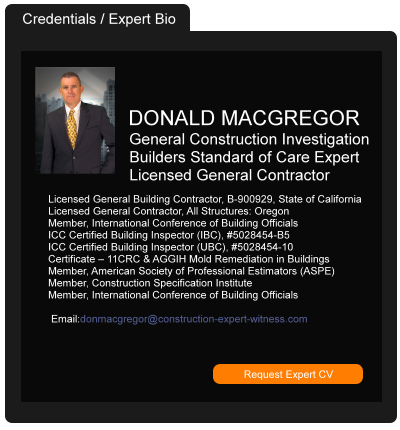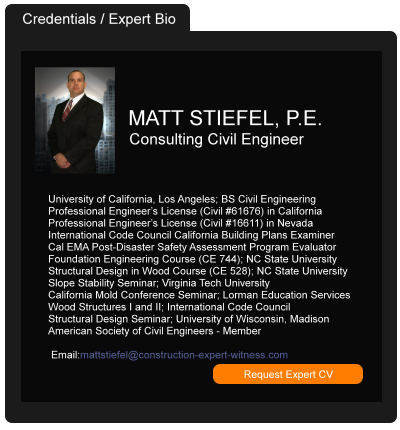Tips for Drafting Construction Contracts
May 04, 2020 —
Stuart Rosen - Construction ExecutiveWhen negotiating a construction contract, a contractor and its advisers must first determine the areas of greatest concern.
For example, if the contractor believes that the drawings that were prepared by the architect and other design professionals are deficient, the contractor may want to reference those deficiencies in the contract. The contractor should emphasize that it is not responsible for the drawings and to the extent the project schedule is extended to allow the parties to address such issues with the drawings, the contractor would be entitled to additional compensation.
This article provides contractors with additional tips, with a broad focus on project delays, for their protection when negotiating and drafting construction contracts, and helps contractors understand the rationale for such tips to better prepare contractors in such negotiations.
Contractor’s liability to the owner for delay damages
It is imperative that the contract include a waiver of claims for consequential damages. AIA Document A201TM – 2017 includes such a waiver, which provides, in pertinent part, “The Contractor and Owner waive Claims against each other for consequential damages arising out of or relating to this Contract … This mutual waiver is applicable, without limitation, to all consequential damages due to either party’s termination in accordance with Article 14.”
Reprinted courtesy of
Stuart Rosen, Construction Executive, a publication of Associated Builders and Contractors. All rights reserved.
Read the court decisionRead the full story...Reprinted courtesy of
Mr. Rosen may be contacted at
srosen@proskauer.com
Update Regarding McMillin Albany LLC v. Super Ct.
April 28, 2016 —
Richard H. Glucksman and David A. Napper – Chapman Glucksman Dean Roeb & Barger In FocusThe construction industry continues to await the California Supreme Court's highly anticipated decision regarding McMillin Albany LLC v. Super Ct. 2015 F069370 (Cal.App.5 Dist.). The Supreme Court will attempt to resolve the conflict presented by the Fourth Appellate District Court's holding in Liberty Mut. Ins. Co. v. Brookfield Crystal Cove LLC (2013) 219 Cal.App.4th 98 and rejection of the same by the Fifth Appellate District Court in McMillin Albany. The issue is whether the Right to Repair Act (SB800) is the exclusive remedy for all defect claims arising out of new residential construction sold on or after January 1, 2013. CGDRB has been closely monitoring the progress of the case and understands that the real parties in interest have submitted their opening brief on the merits. The Court granted Petitioners a further and final extension to file the answer brief on the merits. The answer deadline is Monday April 25, 2016. Stay tuned.
Reprinted courtesy of
Richard H. Glucksman, Chapman Glucksman Dean Roeb & Barger and
David A. Napper, Chapman Glucksman Dean Roeb & Barger
Mr. Glucksman may be contacted at rglucksman@cgdrblaw.com
Mr. Napper may be contacted at dnapper@cgdrblaw.com
Read the court decisionRead the full story...Reprinted courtesy of
Foreclosures Decreased Nationally in September
October 29, 2014 —
Beverley BevenFlorez-CDJ STAFFAccording to the San Diego Source, in “September 2014, there were 46,000 completed foreclosures nationally, down from 68,000 in September 2013, a year-over-year decrease of 32.6 percent and down 61 percent from the peak of completed foreclosures in 2010, according to the September National Foreclosure Report of CoreLogic.”
Between 2000 and 2006, “completed foreclosures averaged 21,000 per month nationwide.” Furthermore, the San Diego Source reported that “[s]ince the financial crisis began in September 2008, there have been approximately 5.2 million completed foreclosures across the country, and since homeownership rates peaked in Q2 of 2004, there have been approximately 7 million homes lost to foreclosure.”
Read the court decisionRead the full story...Reprinted courtesy of
Best Lawyers Honors 48 Lewis Brisbois Attorneys, Recognizes Four Partners as 'Lawyers of the Year'
August 30, 2021 —
Lewis BrisboisBest Lawyers has selected 48 Lewis Brisbois attorneys across 27 offices for inclusion in its list of 2022 Best Lawyers in America. It has also recognized four Lewis Brisbois partners as "Lawyers of the Year": Cleveland/Akron Partner John F. Hill (Bet-the-Company Litigation); San Diego Partner Marilyn R. Moriarty (Medical Malpractice Law - Defendants); Portland Managing Partner Eric J. Neiman (Medical Malpractice Law - Defendants); and Sacramento Partner Eric J. Stiff (Corporate Law).
Please join us in congratulating these four partners and the following attorneys on their Best Lawyers recognition.
Seattle Partner Randy J. Aliment: Commercial Litigation
Reno Managing Partner Jack G. Angaran: Insurance Law, Litigation - Construction, Litigation - Real Estate
Los Angeles Partner Brian G. Arnold: Litigation - Intellectual Property, Litigation - Patent
Los Angeles/Orange County Partner John L. Barber: Employment Law - Management, Litigation - Labor and Employment Read the court decision
Read the full story...
Reprinted courtesy of Lewis Brisbois
Personal Thoughts on Construction Mediation
September 20, 2021 — Christopher G. Hill - Construction Law Musings
Construction Mediation WorksAs I left a mediation last week at 8:30 at night, I realized something that I knew all along. Mediation works.
Why does mediation work? For several reasons that I can think of.
The first, and likely most important is that lawyers are expensive. In most construction cases, we charge by the hour and those hours build up, especially close to a trial date. A mediated settlement can avoid this sharp uptick in attorney fees that always occurs in the last month before trial. Therefore the earlier the better.
The second is the flexibility to make a business decision. Commercial contractors and subcontractors are in a business, and they should be making business decisions. While one such decision can be to go to litigation; litigation is not always the best solution from a financial, or stress perspective. Construction professionals, with the assistance of construction attorneys, can come up with a creative way to deal with a problem and solve it. Read the court decision
Read the full story...
Reprinted courtesy of The Law Office of Christopher G. Hill
Mr. Hill may be contacted at chrisghill@constructionlawva.com
California Court of Appeal Holds That the Right to Repair Act Prohibits Class Actions Against Manufacturers of Products Completely Manufactured Offsite
February 06, 2019 — Gus Sara - The Subrogation Strategist
In Kohler Co. v. Superior Court, 29 Cal. App. 5th 55 (2018), the Second District of the Court of Appeal of California considered whether the lower court properly allowed homeowners to bring class action claims under the Right to Repair Act (the Act) against a manufacturer of a plumbing fixture for alleged defects in the product. After an extensive analysis of the language of the Act, the court found that class action claims under the Act are not allowed if the product was completely manufactured offsite. Since the subject fixture was completely manufactured offsite, the Court of Appeal reversed the lower court’s decision. The court’s holding establishes that rights and remedies set forth in the Right to Repair Act are not available for class action claims alleging defects in products completely manufactured offsite.
In Kohler Co., homeowners instituted a class action against Kohler, the manufacturer of water pressure and temperature regulating valves that were installed into their homes during original construction. The class action was filed on behalf of all owners of residential dwellings in California in which these Kohler valves were installed as part of original construction. The complaint asserted, among other claims, a cause of action under the Act. Kohler filed a motion for anti-class certification on the ground that causes of actions under the Act cannot be certified as a class action. The trial court denied the motion with respect to the Act but certified its ruling for appellate review. Kohler filed a petition with the Court of Appeals, arguing that certain sections of the Act explicitly exclude class action claims under the Act. Read the court decision
Read the full story...
Reprinted courtesy of Gus Sara, White and Williams LLP
Mr. Sara may be contacted at sarag@whiteandwilliams.com
Should I Stay or Should I Go? The Supreme Court Says “Stay”
June 10, 2024 — Brendan J. Witry - The Dispute Resolver
In the construction industry, arbitration is a frequently agreed-upon and utilized dispute resolution method. The Federal Arbitration Act (the “FAA”), 9 U.S.C. 1, et seq., provides the underpinning and framework for how courts should handle litigation in connection with arbitration agreements. Where a party asserts that a claim brought in court should be subject to arbitration, Section 3 of the FAA provides that the action should be stayed. However, some courts have entertained a party’s request to dismiss a suit where the claim is subject to an arbitration agreement, creating a circuit split in the federal appeals courts. In Smith v. Spizzirri, 2024 WL 2193872, issued on May 16, 2024, the Supreme Court held that, absent some other defect (such as the lack of personal or subject matter jurisdiction), Section 3 of the FAA requires a court which finds a claim is subject to an arbitration must stay the lawsuit during the arbitration proceedings rather than dismissing the action.[1] In so doing, the Court addressed a question that for years it left unanswered.
While most Circuits held, prior to Smith, that Section 3 requires a court to stay the litigation pending an arbitral award; the First, Fifth, Eighth, and Ninth Circuits each held that a court could dismiss an action in lieu of staying.
In Smith, both parties acknowledged the underlying claims were arbitrable, but when the district court compelled arbitration, the court dismissed the action rather than staying the court proceedings. The Ninth Circuit (relying on its prior precedent) affirmed, with two judges noting that the Ninth Circuit’s approach was incorrect. The Supreme Court granted certiorari and reversed. Read the court decision
Read the full story...
Reprinted courtesy of Brendan J. Witry, Laurie & Brennan LLP
Mr. Witry may be contacted at bwitry@lauriebrennan.com
Sanctions of $1.6 Million Plus Imposed on Contractor for Fabricating Evidence
March 16, 2017 — Paul R. Cressman, Jr.
King County Superior Court issued sanctions of $1,641,721 in favor of Gefco and against Cascade Drilling, Inc. and its President, Bruce Niermeyer, composed of $1,394,435 in attorneys’ fees and $247,286 in expert fees. [i]
Cascade Drilling is a contractor. Gefco manufactures and sells large drilling machinery. The dispute centered around a project that began in 2008. Cascade was hired to drill a water well at a housing development in Wheeler Canyon, California. Cascade used a 50K drilling rig purchased from Gefco. The pump drive shafts on the drilling rig failed four times. After each failure, Cascade ordered a replacement pump drive shaft from Gefco.
In September 2008, Cascade ordered drilling equipment for an unrelated drilling rig from Gefco, but did not pay Gefco. Gefco then sued to collect. Cascade admitted not paying, but asserted counterclaims alleging that Gefco was indebted to Cascade for non-conforming and defective goods, including the replacement pump drive shafts purchased from Gefco for the Wheeler Canyon project. Read the court decision
Read the full story...
Reprinted courtesy of Paul R. Cressman, Jr., Ahlers & Cressman PLLC
Mr. Cressman may be contacted at pcressman@ah-lawyers.com


































































